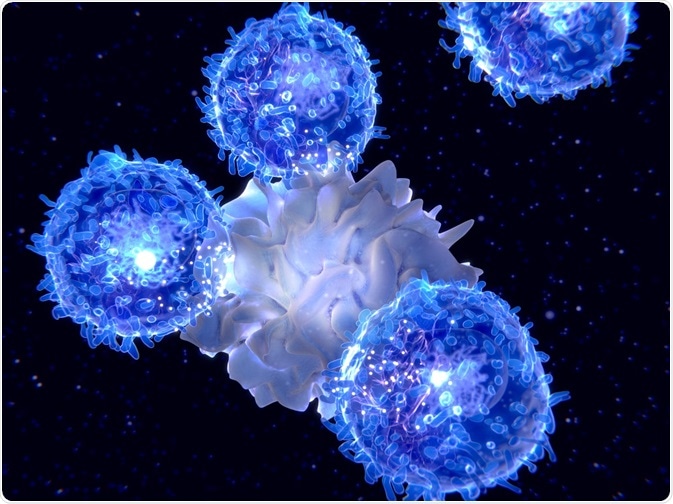
Functions of MHC in the Immune System
The major histocompatibility complex (MHC) is a group of genes that encode proteins on the cell surface that have an important role in immune response.
 Credit: Juan Gaertner/Shutterstock.com
Credit: Juan Gaertner/Shutterstock.comTheir main role is in antigen presentation where MHC molecules display peptide fragments for recognition by appropriate T-cells. This is an important process in the immune system response for destroying invading pathogens.
The MHC complex on the cell surface is necessary for cell self-recognition and the prevention of the immune system targeting its own cells. Certain MHC alleles are associated with an increased risk of autoimmune disease such as Hodgkin’s lymphoma and multiple sclerosis.
Another function of the major histocompatibility complex is tissue allorecognition, an important factor in the prevention of successful organ transplantation.
MHC and antigen presentation
The MHC controls how the immune system detects and responds to specific antigens. Antigen specificity of T-cell recognition is controlled by MHC molecules with different antigen presentation between MHC class I and class II molecules.
The two classes of MHC molecule have a similar function involving the delivery of short peptides to the cell surface for recognition by CD8+ and CD4+ T-cells respectively. MHC class I molecules present antigens that are intracellular or endogenous, whilst MHC class II molecules present antigens that are extracellular or exogenous. The MHC class I complex at the surface of the cell disconnects over time, leading to internalization into the endosome and entrance into the MHC class II pathway.
Cross presentation also occurs where MHC class I molecules present extracellular antigens to CD8+ T-cells. Degradation through autophagy can cause endogenous antigens to be presented by MHC class II molecules. Many viruses have evolved proteins that prevent antigen presentation by MHC molecules through the degradation or mislocalization of MHC molecules. Cross presentation is particularly important for responding to viruses that do not readily infect antigen-presenting cells.
MHC and autoimmunity
Certain MHC molecules are associated with an increased risk of autoimmune and inflammatory diseases. The MHC HLA-B antigens were first found to have increased frequency in patients with Hodgkin’s lymphoma in 1967. Other conditions associated with specific MHC molecules include multiple sclerosis, Crohn’s disease and rheumatoid arthritis.
A pooled analysis of MHC disease associations found that there is shared disease susceptibility to alleles that arise from HLA-DR4 haplotypes, indicating that there is both common and disease-specific associations between MHC and autoimmunity.
The mechanism behind the association between MHC and autoimmune disease has not been fully defined but is potentially reflecting a breakdown in tolerance to self-antigens in abnormal MHC class II molecule antigen presentation. Specific MHC class II alleles are therefore likely determinates of autoantigen targeting, resulting in disease association.
MHC and tissue allorecognition
Allorecognition is the ability of an organism to distinguish its tissues from those of another organism within the same species and has important implications for transplantation. A risk of organ transplantation is the alloresponse, where the histoincompatible antigen is recognized, producing an adaptive immune response via the employment of allospecific T-cells.
This can lead to rejection of the transplanted tissue. The MHC is involved in the direct mechanism of allorecognition where T-cells recognize determinants on the donor MHC molecule-peptide complex displayed at the cell surface. This is because the MHC molecules display an antigenic determinant called an epitope that is either self or non-self, with antigens from the transplanted cells recognized as non-self.
To prevent an alloresponse in non-tolerant recipients, immunosuppressive drugs are provided but are known to cause long-term adverse effects. Increased understanding of the MHC role in tissue allorecognition may produce future targets for immunomodulation, reducing the requirement for long-term immunosuppression in transplant patients.
Reviewed by Hannah Simmons, BSc.
Sources:
- The major histocompatibility complex and its functions.
- British Society for Immunology: Antigen Processing and Presentation.
- Towards a systems understanding of MHC class I and MHC class II antigen presentation.
- Defining the Role of the MHC in Autoimmunity: A Review and Pooled Analysis.
- Pathways of major histocompatibility complex allorecognition.
Further Reading
Last Updated: Mar 23, 2018





















.jpg)












No hay comentarios:
Publicar un comentario